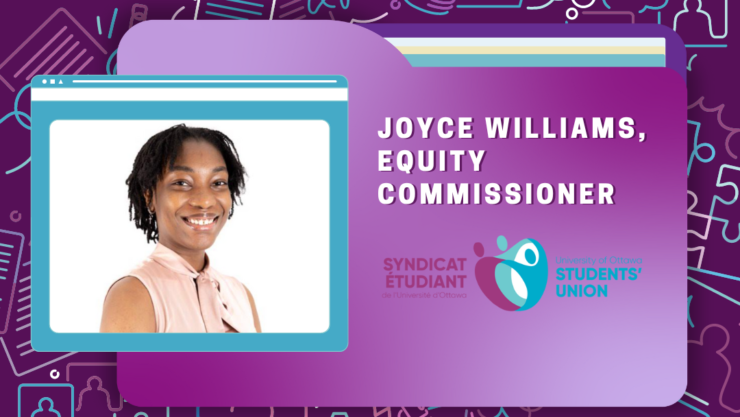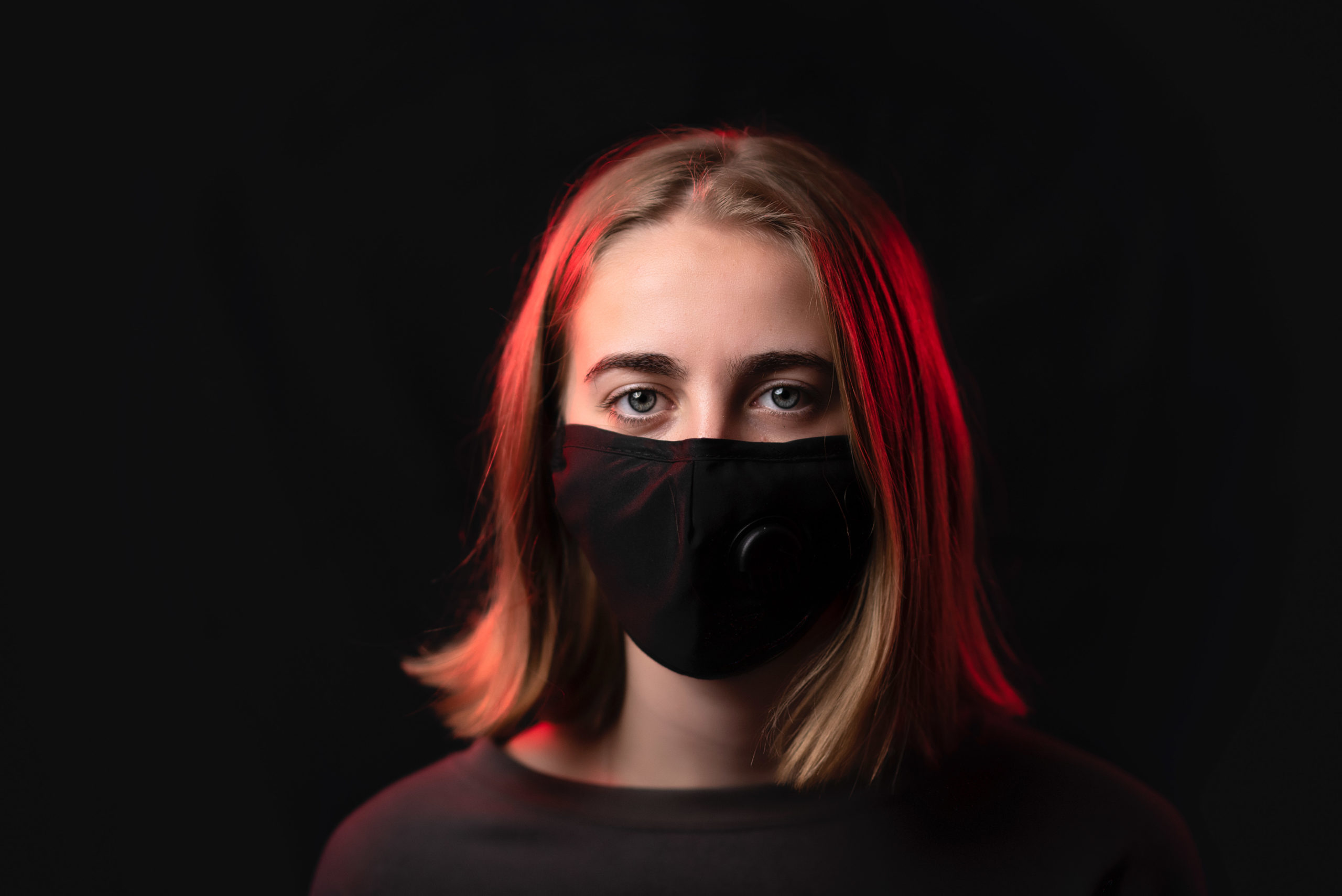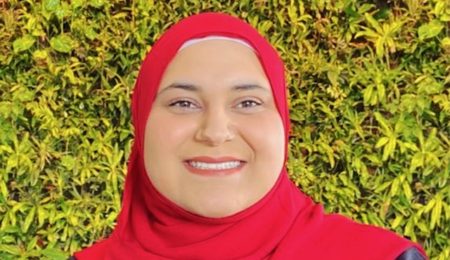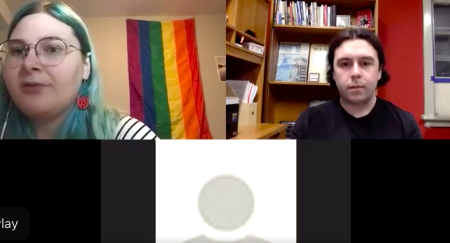“I wanted to be a representative for my community and for international students, for not only Black students but all minorities on campus. I think they deserve to have someone be there permanently.”
On July 11, The Fulcrum spoke with equity commissioner for the University of Ottawa Students’ Union (UOSU), Joyce Williams. What follows is a transcript of that conversation, lightly edited for readability.
The Fulcrum (F): Would you mind introducing yourself in two or three sentences? And could you include your program and your study for me?
Joyce Williams (JW): I am Joyce Williams. I’m in my third year at Telfer studying international management and business tech management. I’m an international student of Congolese origin. I grew up in Kenya so I’m Anglophone and Francophone, but predominantly Anglophone and [have lived] in Canada since 2021. I decided to run for the position of equity commissioner because a friend suggested that I should, and also I heard about there being a lack of representation in this position. There hasn’t really been a long-lasting equity commissioner for the past year or two.
F: Can you talk about your previous involvement in student life on campus or any relevant experience that you feel is helping you in this role?
JW: This role is very unique. It’s very different from what I’ve done before. The only thing that I could say that I did prior to this was being an executive in the UOCongolese Association. I was the director of communications, hosting events communicating with our members. Lots of emails! I think that may have helped a little bit in this role, but also at the same time, I was kind of thrown into it. There hasn’t been anyone prior to me that I could learn from, unlike some other execs who had people holding their position in the past, so they can refer to them whenever they have questions. I’ve had to navigate this role on my own, and more or less create my own position.
F: You’re definitely defining the role as you go, but in your own words, could you tell me about the mandate of equity commissioner in your own words?
JW: Yes. So the equity commissioner is mainly here to advocate for minorities on campus, equity-seeking groups on campus. I work in tandem with the advocacy commissioner which is why I use the word “advocate”. But I’d say advocacy is more external, where equity is more internal, and I feel like I work closer with students when it’s equity-based issues, that would be my purview. And when it’s campaigns and all that, that will be Maisy. But we work together a lot. And I think that’s mainly how I describe my role as equity commissioner, just to be that point of contact for students that are seeking equity on campus.
F: Could you give me a rundown of your portfolio as equity commissioner? And when should students reach out to you versus say the advocacy commissioner?
JW: I guess it would be things that have to do with diversity concerns. So like if there’s discrimination that [students are] facing, if there’s something that they feel like should be changed in order to make campus a bit more equitable, something that would help us be more inclusive. If there’s a concern they have that has to do with justice, that will be Maisy; if it’s concerned with equity, diversity, inclusivity that would be me.
F: Are there any issues you believe UOSU should be spending more time and resources tackling than they might have been past terms?
JW: Yes, the first thing that comes to mind is advocating for international students and considering their point of view. If I’m being honest, I don’t think we’ve had a lot of representation on the board for international students, so it’s very difficult to understand what they’re going through,what they’re facing, and what they need help with when there’s no one representing them.
I think we need to make our Board and exec more accessible to international students, and we need to improve our communication. I know that’s repeated by everyone [on exec], but we need to improve our communication and let people know that it’s possible to get a position with the board and to make your voice heard.
I also think that we need to create a safer space for the LGBTQ+ community, specifically the groups that are in need of universal spaces and gender-neutral spaces. That’s not really something that’s been done yet. I know that people have been working on it for the past two years and it’s a back and forth process for [the] university and it’s very long, but it’s something that I’m hoping at least I’ll be able to help with. And if not, I’ll be able to at least get us a bit closer to achieving that.
F: You’ve touched on communication, but how do you intend to facilitate communication or how have you been facilitating communication between the board and the executive committee?
JW: Yeah, we do use [Microsoft] Teams, just because it’s more professional. It’s easier to communicate. As you’ve probably seen — and as everyone who is interested in attending board meetings has seen — everyone on the board has a lot to say. And I think because Teams are the more professional work app, it allows us to be a bit more concise. So any points we have, we won’t ramble on, it limits what we say and it keeps the communication centered on UOSU-related matters and the most important matters.
Execs have to come [into the office] at least twice a week, but I see all of us have been coming in more frequently than that. We’ve been very available. Our office hours are open and we let our board members know what our board members know that they can come to us whenever they need, they can email us whenever they need. And I can confidently say that they’re taking advantage of that, which is a good thing. I think we have a very engaged board this year.
F: That’s great to hear. Can you tell me about what committees you’re chairing or a part of, and why did you want to be part of those committees in particular?
JW: Right now I chair the equity committee and I am an advocacy committee member. It’s in the constitution. So anyone who holds my position would have to be an advocacy committee member and would have to chair the equity committee . I haven’t really taken on anything more than that, just because I have a lot on my plate . I think people already know by now that the Constitution was adjusted because of a situation that I had prior to the election, the new constitution not being available to me before I ran.
So I am still taking classes and that’s why I couldn’t join other committees. But if I could, I think I would have loved to join the services committee, because a huge part of what I do is work closely with equity-based services [Pride Centre, Multi-Faith Centre, International House, Feminist Resource Centre (FRC), Racialized and Indigenous Students Experience Centre (RISE), Centre for Students with Disabilities (CSD)]. And I think it would be good to be more involved in that.
I would also like to be involved with the funds and scholarships committee, because I feel like there’s a lot more we could consider in terms of who can receive scholarships. I think there’s a lot of people that we can [potentially] provide funds for, especially because I think a lot of people are struggling financially right now. So it would be good to have and in that, but that hasn’t really stopped me from still trying to participate in other ways, like passing motions over into the committee and trying to convince them to change a few things.
So there’s that and that’s where the equity and advocacy, they go hand-in-hand. And honestly, I’m just here to be a voice for minorities, people like me. That’s what I’m here for, and that’s why I’m passionate about doing it. So I’m happy that I’m able to be on the advocacy and equity committees even though it’s technically mandated.
F: You’ve touched on this a bit, but why did you choose to run for equity commissioner and do you believe the election turnout gave you a strong mandate from the students?
JW: Why I chose this I think I already mentioned that, I knew that this role hadn’t been filled for a long time in the past. But also, I wanted to be a representative for my community and for international students, for not only Black students, but all minorities on campus. I think they deserve to have someone be there permanently,knock on wood, because you never know what could happen in the future. But at least for as long as I can,I would like to be here long enough to make a change that is substantial. And I think it’s good to have a point of contact [for them], like I said before, because not having an equity commissioner, it prevents us from being equitable as much as we would like to try to be, as much as other execs can take on the role of equity commission and kind of share it. It’s still not the same as having someone be there specifically for your group, specifically for your issues. And so I wanted to be that person for equity-seeking groups.
As for the election turnout, honestly, it was very low. So I don’t think I can say in good faith that it’s fair, just because we don’t really get to hear everyone’s choice. We don’t really get people participating in the elections. So though it’s not ideal, I still feel confident in my role, just because the few people that did decide to vote decided to choose me, although the margin was very small. I still feel confident because those people had faith in me and that pushes me to actually do my job and do my job well, because they want me to be there to advocate.
F: What are or were some of your top concerns coming into the role?
JW: First, I was concerned that it would be too much for me. I knew prior to running that I would be taking full courses and [position meant I’d] be [working] full time. Also, knowing the history of the past equity commissioners and them not completing their full mandate. Obviously, I didn’t know the full story. It kind of worried me a bit because I was like, ‘Why would they leave? Is there something wrong?’ There were just a lot of unanswered questions. So yeah, that was a concern that I had.
The second would be whether or not I’d have enough support in the union, just because I know having a position that has to do with equity can be taxing because a lot of the time the issues that I deal with are very sensitive and heavy. And that can be a lot for one person to take,so I had to mentally prepare myself for that. But it’s helpful to know that the other execs and managers are there to give me support, if needed. Whenever I feel like something is too much, I can always rely on, say Maisy, to take it on from me [and] they can do the same. Basically vice-versa.
F: That’s great to hear. So second-last question. We’re almost there. What should students be paying attention to from UOSU over the summer? I know you guys are taking part in the Pride Parade,that’s pretty exciting.
JW: Yeah, I was about to say that —the [Pride] parade march that we’re doing in August. So that’ll be great. It’s very close to the beginning of the fall semester, so my teammates will be coming back and seeing more people on campus and getting to interact with other students.
In the summer honestly, everything I’m thinking of is kind of internal. But event-based, I don’t think that’s much. I would say though that we changed the name of the Women’s Resource Centre (WRC) to Feminist Resource Centre (FRC), which is I’ve been saying FRC instead of WRC just so it’s a bit more inclusive. Because it’s not just women that access that resource, and I think we need to have a name that represents that and that’s welcoming to all. We also have the Centre for Students with Disabilities (CSD) changed its name in French [to Le Centre des étudiant·e·s ayant un handicap (CÉH)] just to be more respectful to students with disabilities, and more inclusive.
And another thing that I’m working on [in] partnership with the university is the Period Project, we’re planning on adding an extra dispenser in a building on campus. I am still in discussion with the university about which building that will be so I’ll hold off on mentioning that. But fingers crossed, it will be the building that I’m gunning for it, and by the Fall it will be available because we’ve been wanting this since last year and it hasn’t happened yet, but I’ll be proud of myself if we’re able to accomplish that.
[Since this interview took place a period product dispencer has been installed in the Faculty of Social Sciences building (FSS).]
F: Do you have any feelings about the number of vacancies on the board but also part of the committee you’ve hired? You have a couple of interim commissioners and you’re still hiring, I believe the rest or have hired them now. Can you speak a bit to the role of why the interim roles are different and what they contribute to the overall governance of UOSU?
JW: Okay, well it’s not necessarily the most ideal situation to have people who weren’t elected by students be in those positions, it is still important to have people take on roles that are vacant, because the rules are there for a reason. For the faculty advisors, I think it’s important just like I said about the lack of international students representation. It’s important to have every faculty and it’s important to have more than just one representative in those faculties. Just because I think it needs to be equitable, and we need to know everyone’s perspective.
I don’t think it would be impossible, I guess, to run the board without interim directors, but I still think it’s best to hear from different perspectives. So in the same way that the faculty of social sciences (FSS) may have five directors, one might have this perspective, the others might add something else that we didn’t consider. So I think that’s why it’s important to have them. But also, the benefit of having a by-election is that students don’t get to see who they want to actually hold those positions. So it’s not permanent.
And the most important thing at the end of the day is the students’ choice. As for the executives, I wouldn’t say the same, but it’s a bit more…I describe it as the rules are very detailed and specific. And only three of us were actually elected, and filling those roles would be almost impossible. Student life [comissioner], I think everyone can agree that they have the busiest summer, planning 101 week, and having [the elected executives take on those] roles, having to be a student life and Francophone and clubs and Services Commissioner would be insane. We will be working way more than we need to, and I think it’s just helpful to have people who are able to do those roles.
While we wish to have student-elected commissioners actually fill in those roles, am I concerned about the two that are empty right now? Not really just, because we have a really good working team right now [that’s] fabulous with two interns we hired in May. And I think we’ve all been doing a great job and we work really well together as a team. The absence isn’t felt that much, like it’s not a huge impact, which I think is a good thing because we’re not slowed down. Also for the clubs and services, just having the Deputy Commissioner take on that role while we wait for the by-election has also been helpful, especially because the person that was chosen did work as Deputy Commissioner last year and is familiar with the role and just hit the ground running once they started. Which was helpful in the sense of like we didn’t waste any time having to train them.
F: Okay, well, that’s awesome to hear. It sounds like you guys are super busy, but, you know, good, and I’m happy to hear that. So if there’s anything I haven’t asked you that you’d like to include, or have touched on in this article, now would be your time to voice it… But that’s everything for today for me.
JW: Okay, that’s great. Thank you for interviewing me. I did have one thing to add though, and that will be for anyone that is reading this: Please run if you’re able to. If you’re interested in the position, go for it. It would be nice to see new faces be interested in student politics/government, but just be interested in the UOSU and being a representative. Like I said before, I only had the experience of working as a club executive and nothing else before and so far things have been going well. So I think just go for it, it would be good to get a fresh perspective that’s different from what we’ve seen before. And it will be nice to see more people participate compared to the last election.








